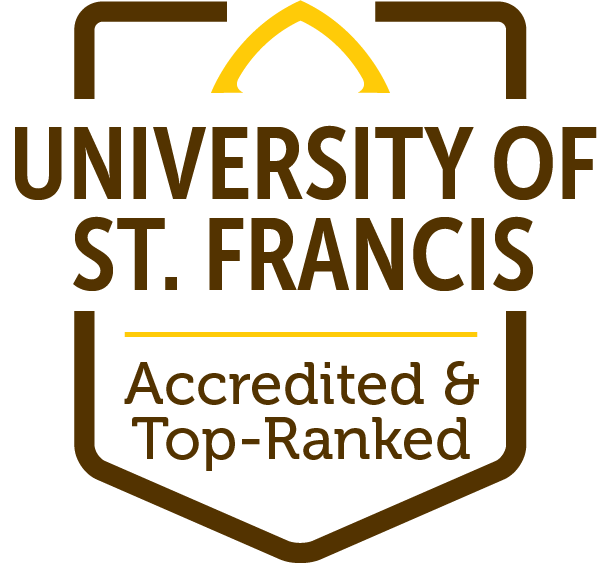USF’s Master of Social Work (MSW) program is accredited by the Council on Social Work Education, offering online and in-person program options with convenient evening and weekend classes for part-time and full-time students. If you’re passionate about making a difference in the world by helping others and effecting social change, the University of St. Francis will prepare you for a fulfilling career!
No GRE test score is required for admission, and applicants with a BSW degree from an accredited program may be eligible for advanced standing. You can transfer credit hours if you’ve started your studies at another school. We also offer a post-master’s certificate in School Social Work. Candidates must hold a Master of Social Work degree from a Council on Social Work Education (CSWE) accredited program.
In-Person, Online
$608/credit hour
12-24 Months (full-time)
Our Master of Social Work program prepares students to become change agents committed to social and economic justice while working with individuals, families, groups, organizations and communities. It aims to prepare culturally conscious leaders to serve and work alongside diverse populations, using social work values and evidence-based methods of intervention to create change. The in-person program is offered at USF’s main campus in Joliet, Illinois, with convenient evening and weekend classes to meet our students’ needs. The online program is available nationwide; students obtain real world experience by interning within their local community.

Advanced Generalist Practice
Allows students to choose from a variety of specialties in the field of Social Work including child welfare, criminal justice, domestic violence, and immigration, just to name a few. These specialties are developed through research, practicum and elective coursework.
School Social Work
A specialized area of practice where students are trained as mental health professionals who provide social and emotional support to students and families, serve as community liaisons, and partner with and support administration and school personnel for the betterment of students. Note: USF is approved by the Illinois State Board of Education (ISBE) to offer a Professional Educators License (PEL) School of Social Work Endorsement through this concentration.
Post-Master’s Certificate: School Social Work
How to engage in micro, mezzo, and macro level practice with diverse populations.
The leadership skills necessary to meet the needs of multicultural communities.
The critical thinking and evaluation skills needed to act as change agents.
At the end of this program, students will be competent in the following:
Competency 1: Demonstrate Ethical and Professional Behavior
Competency 2: Advance human rights and social, Economic, and environmental justice
Competency 3: Engage Anti-Racism, Diversity, Equity and Inclusion (ADEI) in practice
Competency 4: Engage in practice-informed research and research-informed practice
Competency 5: Engage in Policy Practice
Competency 6: Engage with individuals, families, groups, organizations and communities
Competency 7: Assess individuals, families, groups, organizations and communities
Competency 8: Intervene with individuals, families, groups, organizations and
communities
Competency 9: Evaluate practice with individuals, families, groups, organizations and
communities
 The University of St. Francis is accredited by both the Higher Learning Commission (hlcommission.org) and the Illinois Board of Higher Education (ibhe.org). This program is accredited by the Council on Social Work Education (cswe.org).
The University of St. Francis is accredited by both the Higher Learning Commission (hlcommission.org) and the Illinois Board of Higher Education (ibhe.org). This program is accredited by the Council on Social Work Education (cswe.org).
 Our programs are top-ranked! U.S. News & World Report has placed the University of St. Francis on several of its annual listings, year after year, including its “Best National Universities,” “Best Value Schools” and “Best Online Programs” lists.
Our programs are top-ranked! U.S. News & World Report has placed the University of St. Francis on several of its annual listings, year after year, including its “Best National Universities,” “Best Value Schools” and “Best Online Programs” lists.
“Re-entering school as an adult with a full-time career, life’s responsibilities, and more than 20 years since completing my bachelor’s degree, was no easy feat. I chose USF’s online MSW program because they created an educational setting where I felt supported, motivated, and equipped with essential tools necessary for me to enhance my skills of becoming a professional social worker. The professors, support staff, and peers alike created an environment that kept me both excited and challenged. USF’s online MSW program not only expanded my social work knowledge, but also provided me practical skills that I was able to apply immediately in the field and continue to use, which I will forever be grateful for!”
Monique A. Bell ’24, MSW Program Graduate

Share the best way to reach you, and our team will be in touch with more information about graduate programs at St. Francis.
Curious to know more about online learning and what it entails? USF prides itself on delivering a practical, real-world curriculum and faculty expertise in a medium proven to be conducive to the needs of working adults. Explore USF’s online learning environment here!
Continuing and adult students are eligible for some aid and scholarships. Review our scholarships page to see what’s available to make financing your education easier.
Our admissions staff is here to make sure every question you have about graduate studies gets answered. Learn more about graduate studies and make an appointment today!
Graduate students are invited to participate in student life, even if you’re an adult or studying from afar! Learn about the resources USF provides to all students to prepare them for success.